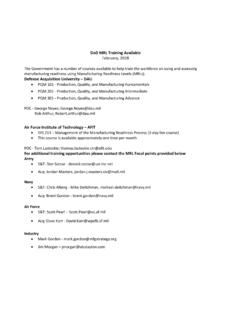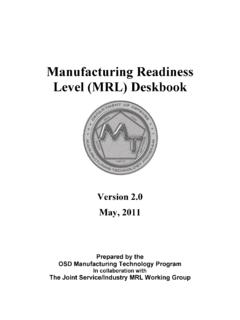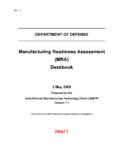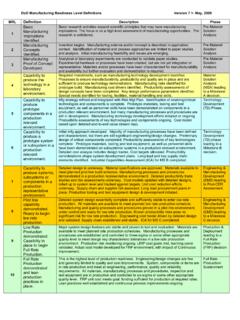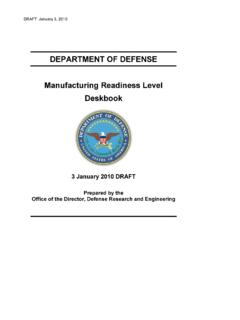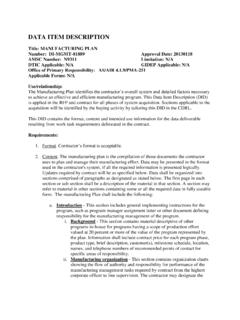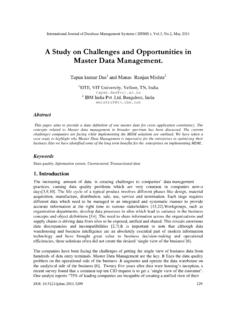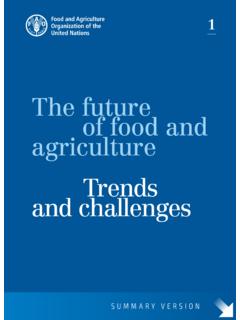Transcription of MANUFACTURING READINESS LEVEL DEFINITIONS MRL 1: …
1 B-1 MANUFACTURING READINESS LEVEL DEFINITIONS There are ten MRLs (numbered 1 through 10) that are correlated to the nine TRLs in use. The final LEVEL (MRL 10) measures aspects of lean practices and continuous improvement for systems in production. MRL 1: Basic MANUFACTURING Implications Identified This is the lowest LEVEL of MANUFACTURING READINESS . The focus is to address MANUFACTURING shortfalls and opportunities needed to achieve program objectives. Basic research ( , funded by budget activity) begins in the form of studies. MRL 2: MANUFACTURING Concepts Identified This LEVEL is characterized by describing the application of new MANUFACTURING concepts. Applied research ( , funded by budget activity ) translates basic research into solutions for broadly defined military needs.
2 Typically this LEVEL of READINESS in the S&T environment includes identification, paper studies and analysis of material and process approaches. An understanding of MANUFACTURING feasibility and risk is emerging. MRL 3: MANUFACTURING Proof of Concept Developed This LEVEL begins the validation of the MANUFACTURING concepts through analytical or laboratory experiments. This LEVEL of READINESS is typical of technologies in the S&T funding categories of Applied Research and Advanced Development ( , funded by budget activity ). Materials and/or processes have been characterized for manufacturability and availability but further evaluation and demonstration is required. Experimental hardware models have been developed in a laboratory environment that may possess limited functionality.
3 MRL 4: Capability to produce the technology in a laboratory environment This LEVEL of READINESS is typical for S&T Programs in the budget activity and categories and acts as an exit criterion for the Materiel Solution Analysis (MSA) Phase approaching a Milestone A decision. Technologies should have matured to at least TRL 4. This LEVEL indicates that the technologies are ready for the Technology Development Phase of acquisition. At this point, required investments, such as MANUFACTURING technology development, have been identified. processes to ensure manufacturability, producibility, and quality are in place and are sufficient to produce technology demonstrators. MANUFACTURING risks have been identified for building prototypes and mitigation plans are in place.
4 Target cost objectives have been established and MANUFACTURING cost drivers B-2 have been identified. Producibility assessments of design concepts have been completed. Key design performance parameters have been identified as well as any special tooling, facilities, material handling and skills required. MRL 5: Capability to produce prototype components in a production relevant environment This LEVEL of maturity is typical of the mid-point in the Technology Development Phase of acquisition, or in the case of key technologies, near the mid-point of an Advanced Technology Demonstration (ATD) project. Technologies should have matured to at least TRL 5. The industrial base has been assessed to identify potential MANUFACTURING sources.
5 A MANUFACTURING strategy has been refined and integrated with the risk management plan. Identification of enabling/critical technologies and components is complete. Prototype materials, tooling and test equipment, as well as personnel skills have been demonstrated on components in a production relevant environment, but many MANUFACTURING processes and procedures are still in development. MANUFACTURING technology development efforts have been initiated or are ongoing. Producibility assessments of key technologies and components are ongoing. A cost model has been constructed to assess projected MANUFACTURING cost. MRL 6: Capability to produce a prototype system or subsystem in a production relevant environment This MRL is associated with READINESS for a Milestone B decision to initiate an acquisition program by entering into the Engineering and MANUFACTURING Development (EMD) Phase of acquisition.
6 Technologies should have matured to at least TRL 6. It is normally seen as the LEVEL of MANUFACTURING READINESS that denotes completion of S&T development and acceptance into a preliminary system design. An initial MANUFACTURING approach has been developed. The majority of MANUFACTURING processes have been defined and characterized, but there are still significant engineering and/or design changes in the system itself. However, preliminary design of critical components has been completed and producibility assessments of key technologies are complete. Prototype materials, tooling and test equipment, as well as personnel skills have been demonstrated on systems and/or subsystems in a production relevant environment. A cost analysis has been performed to assess projected MANUFACTURING cost versus target cost objectives and the program has in place appropriate risk reduction to achieve cost requirements or establish a new baseline.
7 This analysis should include design trades. Producibility considerations have shaped system development plans. The Industrial Capabilities Assessment (ICA) for B-3 Milestone B has been completed. Long-lead and key supply chain elements have been identified. MRL 7: Capability to produce systems, subsystems, or components in a production representative environment This LEVEL of MANUFACTURING READINESS is typical for the mid-point of the Engineering and MANUFACTURING Development (EMD) Phase leading to the Post-CDR Assessment. Technologies should be on a path to achieve TRL 7. System detailed design activity is underway. Material specifications have been approved and materials are available to meet the planned pilot line build schedule. MANUFACTURING processes and procedures have been demonstrated in a production representative environment.
8 Detailed producibility trade studies and risk assessments are underway. The cost model has been updated with detailed designs, rolled up to system LEVEL , and tracked against allocated targets. Unit cost reduction efforts have been prioritized and are underway. The supply chain and supplier quality assurance have been assessed and long-lead procurement plans are in place. Production tooling and test equipment design and development have been initiated. MRL 8: Pilot line capability demonstrated; Ready to begin Low Rate Initial Production This LEVEL is associated with READINESS for a Milestone C decision, and entry into Low Rate Initial Production (LRIP). Technologies should have matured to at least TRL 7. Detailed system design is essentially complete and sufficiently stable to enter low rate production.
9 All materials are available to meet the planned low rate production schedule. MANUFACTURING and quality processes and procedures have been proven in a pilot line environment and are under control and ready for low rate production. Known producibility risks pose no significant challenges for low rate production. The engineering cost model is driven by detailed design and has been validated with actual data. The Industrial Capabilities Assessment for Milestone C has been completed and shows that the supply chain is established and stable. MRL 9: Low rate production demonstrated; Capability in place to begin Full Rate Production At this LEVEL , the system, component or item has been previously produced, is in production, or has successfully achieved low rate initial production.
10 Technologies should have matured to TRL 9. This LEVEL of READINESS is normally associated with READINESS for entry into Full Rate Production (FRP). All systems engineering/design requirements should have been met such that there are minimal system changes. Major system design features are stable and have been proven in test and B-4 evaluation. Materials are available to meet planned rate production schedules. MANUFACTURING process capability in a low rate production environment is at an appropriate quality LEVEL to meet design key characteristic tolerances. Production risk monitoring is ongoing. LRIP cost targets have been met, and learning curves have been analyzed with actual data. The cost model has been developed for FRP environment and reflects the impact of continuous improvement.
